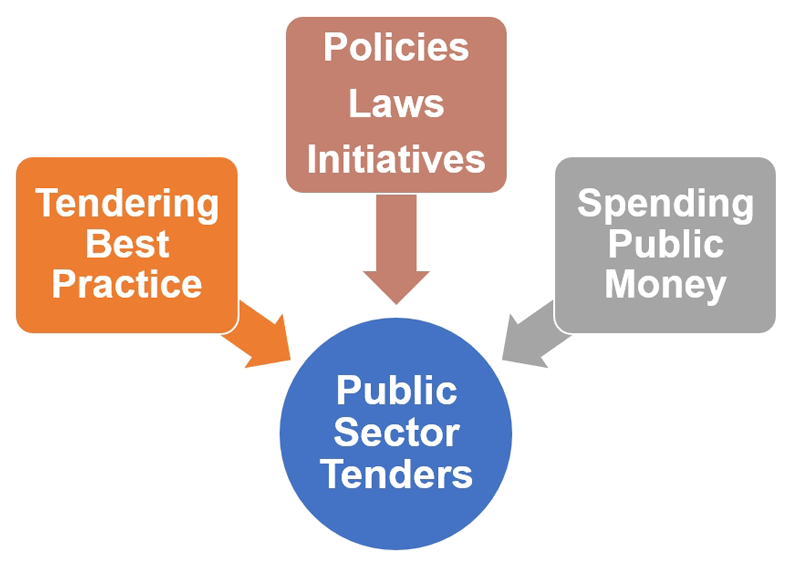Understanding public sector tenders follows on from Why do Companies Tender – so do read that first to get to grips with the reasons for tendering.
The Dynamics of Public Sector Tenders
Councils, central government, NHS, housing associations and the rest of the public sector (or publicly funded organisations) will all go to tender for the same reasons set out in Why Companies Tender. However, there are two drivers that are specific to public sector tenders:
- They are spending public money
- Government wants to ensure that laws, policies and initiatives are met

They are Spending Our Money
It must be remembered that public sector tenders are used to make purchases using our money. As tax payers we all want to see that our money is spent wisely, therefore the public sector use a robust tendering process to help ensure that good procurement procedures are used.
However because it involves public money, the public sector is generally risk-adverse when making purchases; it seeks to minimise the risk of anything going wrong with the contract. This is why you will frequently see qualification items / questions such as:
- The need to show 2-3 years accounts – proof that your company is financially stable
- Having a minimum turnover – to avoid letting a contract to a firm that is too small to easily take on the additional work (2015 Procurement Regulations allow buyers to check that the tender contract value does not exceed 50% of the company’s turnover)
- References for other similar public sector clients – demonstrates your organisation’s proven ability to do the work for the public sector
Put yourself in the shoes of a council officer; you would want to be certain that you’ve done everything to avoid making a bad purchase and should anything go wrong, you could prove to councillors or the press that:
- Robust procurement processes were used
- Action was taken to minimise risk
The need to achieve these factors often means that more people are involved in the tender procurement team (see Tender Procurement Process). This sometimes means that decisions take longer.
Of course all organisations want to have good procurement and minimise risk. This is why corporate tenders are often similar to public sector tenders. Nevertheless, private sector companies may decide to take more chances when making a purchase if they see potential benefits outweighing the risks. For example, choosing a smaller supplier without a track-record who offers a better overall deal.
Public Sector Tenders – Driving Laws and Policies
Not surprisingly, the government must ensure that everything they are involved in complies to the law. Therefore public sector tenders will have extensive questions on legal issues such as:
- Health & Safety
- Equal Opportunities / Equality
All high-value public sector tenders are themselves subject to public procurement regulations. Higher value tenders must be advertised; this adds time to the procurement process. The private sector has no such obligation and can set shorter timescales.
The private sector will also want to see legal compliance. However, public sector procurement will also seek to drive central and/or local government polices and initiatives including:
- Environmental impact
- Local people employed on the contract
- Apprenticeships
- Social benefits – how the supplier will help the local economy
Whilst the public sector is obligated to see these in place, private companies can choose if they want to include them. The exception being when they are procuring to fulfil a public sector tender and so must ensure that their entire supply chain is complying with the original tender’s requirements.
Finding Public Sector Tenders
It’s easy to find government, council and other public tender opportunities. And you can do it for free! Read this guide on finding tenders.
If you want to start winning public sector tenders, contact us for an informal chat about our tender services.
Summary
This is intended as a guide to understanding the different dynamics between public and private/corporate sector bids. It isn’t absolute and of course things will change in future as government initiatives become legal requirements e.g. environmental care is becoming increasingly important.
Understanding the dynamics of public sector tenders can help you improve your success rates. Being aware that the public sector is generally risk-adverse will enable you to write better tender responses and therefore score better marks.
Feel free to add your comments and ideas.

